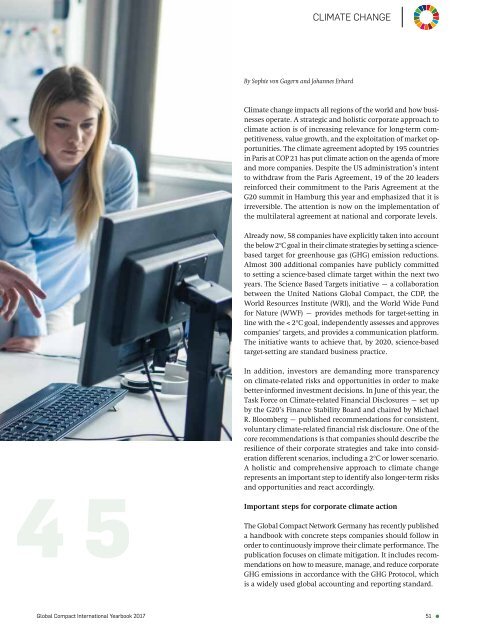Global Compact International Yearbook 2017
Sustainability in Troubled Times We life in times of uncertainty and global (dis)Order. „Understanding global mega-trends is crucial. We live in times of multiple, evolving and mutually-reinforcing shifts“, says UN Secretary-General António Guterres. He adds: „These dynamics, of geopolitical, demographic, climatic, technological, social and economic nature, enhance threats and opportunities on an unprecedented scale.“ Therefore sustainability in troubled times is the key topic of the Global Compact International Yearbook 2017, edited by macondo publishing.
Sustainability in Troubled Times
We life in times of uncertainty and global (dis)Order. „Understanding global mega-trends is crucial. We live in times of multiple, evolving and mutually-reinforcing shifts“, says UN Secretary-General António Guterres. He adds: „These dynamics, of geopolitical, demographic, climatic, technological, social and economic nature, enhance threats and opportunities on an unprecedented scale.“ Therefore
sustainability in troubled times is the key topic of the Global Compact International Yearbook 2017, edited by macondo publishing.
Create successful ePaper yourself
Turn your PDF publications into a flip-book with our unique Google optimized e-Paper software.
CLIMATE CHANGE<br />
By Sophie von Gagern and Johannes Erhard<br />
Climate change impacts all regions of the world and how businesses<br />
operate. A strategic and holistic corporate approach to<br />
climate action is of increasing relevance for long-term competitiveness,<br />
value growth, and the exploitation of market opportunities.<br />
The climate agreement adopted by 195 countries<br />
in Paris at COP 21 has put climate action on the agenda of more<br />
and more companies. Despite the US administration’s intent<br />
to withdraw from the Paris Agreement, 19 of the 20 leaders<br />
reinforced their commitment to the Paris Agreement at the<br />
G20 summit in Hamburg this year and emphasized that it is<br />
irreversible. The attention is now on the implementation of<br />
the multilateral agreement at national and corporate levels.<br />
Already now, 58 companies have explicitly taken into account<br />
the below 2°C goal in their climate strategies by setting a sciencebased<br />
target for greenhouse gas (GHG) emission reductions.<br />
Almost 300 additional companies have publicly committed<br />
to setting a science-based climate target within the next two<br />
years. The Science Based Targets initiative – a collaboration<br />
between the United Nations <strong>Global</strong> <strong>Compact</strong>, the CDP, the<br />
World Resources Institute (WRI), and the World Wide Fund<br />
for Nature (WWF) – provides methods for target-setting in<br />
line with the < 2°C goal, independently assesses and approves<br />
companies’ targets, and provides a communication platform.<br />
The initiative wants to achieve that, by 2020, science-based<br />
target-setting are standard business practice.<br />
4 5<br />
In addition, investors are demanding more transparency<br />
on climate-related risks and opportunities in order to make<br />
better-informed investment decisions. In June of this year, the<br />
Task Force on Climate-related Financial Disclosures – set up<br />
by the G20’s Finance Stability Board and chaired by Michael<br />
R. Bloomberg – published recommendations for consistent,<br />
voluntary climate-related financial risk disclosure. One of the<br />
core recommendations is that companies should describe the<br />
resilience of their corporate strategies and take into consideration<br />
different scenarios, including a 2°C or lower scenario.<br />
A holistic and comprehensive approach to climate change<br />
represents an important step to identify also longer-term risks<br />
and opportunities and react accordingly.<br />
Important steps for corporate climate action<br />
The <strong>Global</strong> <strong>Compact</strong> Network Germany has recently published<br />
a handbook with concrete steps companies should follow in<br />
order to continuously improve their climate performance. The<br />
publication focuses on climate mitigation. It includes recommendations<br />
on how to measure, manage, and reduce corporate<br />
GHG emissions in accordance with the GHG Protocol, which<br />
is a widely used global accounting and reporting standard.<br />
<strong>Global</strong> <strong>Compact</strong> <strong>International</strong> <strong>Yearbook</strong> <strong>2017</strong> 51

















